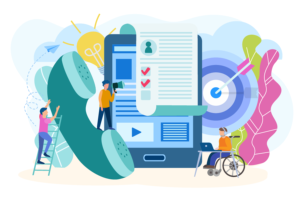
The majority of colleges and universities have a disability resource center (DRC) or office that works to ensure that classes, programs, buildings and other facilities, and services are accessible to students and employees with disabilities. It is through the school’s DRC that a student makes a request for an accommodation when a given class, lab, or building isn’t accessible to them. While the DRC is responsible for these standards and accommodations, faculty can make use of the DRC as well, to improve their classes, classrooms, and labs.
A school’s DRC keeps detailed notes on students with disabilities who have registered with the center. These notes typically include historical and holistic information about the student and their experiences with their disability, as well as a record of previous accommodation requests, and any communication, evaluation, consultation, and approvals and denials thereof. While these notes are largely confidential, the DRC can still advise on what has worked for a given student in the past and any changes you as a faculty member might make to improve accessibility for them. Per the Association on Higher Education and Disability’s (AHEAD) white paper on quality DRC notes, there are three sources for the contents of these notes: the student, disability resource professionals, and third parties, which can include faculty. This means that, as a someone who interacts directly and frequently with students, you may be called upon to provide notes in the event you make a change to improve accessibility. This white paper from AHEAD goes into great detail on what information to include in these notes, and provides insight into what is tracked by DRC professionals, so it may be worth a read.
Your institution’s DRC is also a valuable resource when it comes to understanding your institution’s policies and procedures surrounding disability and accommodations. They can help you better understand what accommodations are available, the expectations of faculty, and how to help and support your students with disabilities. It’s also important to know where the DRC is on your campus and how to contact them, as you may need to refer your students to them if their needs are beyond what you can do on your own. In such a case, make sure you’re not just passing the student along – be ready and available to discuss what your class or program requires students to do, as this information can aid in accommodation decisions.
Additional Resources
- AHEAD’s website has a wealth of information on improving accessibility and equity for people with disabilities in higher education.
- The National Center for College Students with Disabilities (NCCSD), while primarily geared toward students, contains information about resources on disability and higher education that is valuable to faculty as well. Their article about disability resource centers is a quick and helpful read, and their Campus Disability Resource Database (CeDaR) allows users to look up DRC’s by institution, state, disability-related services, and more. This database can be useful if you’re unsure of how to contact your own institution’s DRC, if your student will be transferring or taking an internship or classes at another institution, or if you and/or your DRC would like to make contact with another DRC.




 See More Feature Articles
See More Feature Articles